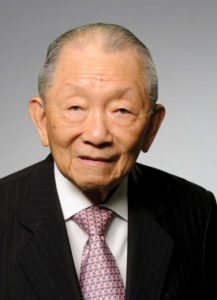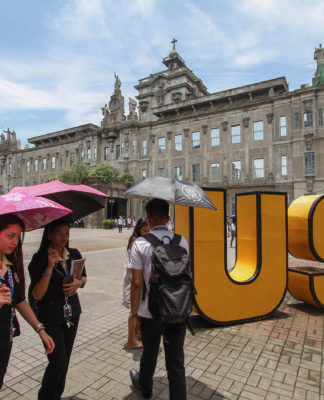IT WAS a case of “if you can’t join them, beat them.”
In 1946 when Filipinos were not allowed to partner with British accounting firms, Thomasian bookkeeper Washington “Wash” SyCip dared to go against these Goliaths and show them the consequences of their discrimination.
He sought to beat them in their own game, in their home court.
SyCip established his own auditing firm that would eventually become the country’s largest professional services powerhouse, the SyCip, Gorres and Velayo (SGV) Group (formerly W. SyCip & Co.).
“Those (British) firms were all Caucasians, and they had a fairly general policy that partners were Caucasians. From my viewpoint I was as good as anyone and should not be subjected to discrimination in my own country,” SyCip said in his biography titled Wash: Only a Bookkeeper (SGV Foundation and AIM Scientific Research Foundation Inc., 2009) written by Jose “Butch” Dalisay Jr.
SyCip worked hard in this practice, finding his business partners along the way–long-time friend Alfredo Velayo and Ramon Gorres, among others. Together, they would lead SGV at the forefront of “Filipinizing” the accounting profession and permanently etch its name in the Asian business landscape.
Investing on people
But like every success story, it was not always easy pickings for SyCip.
The budding Filipino-Chinese businessman almost did everything single-handedly for the firm, while juggling it with a teaching career in UST and two other schools.
His hard work paid off as W. SyCip & Co. began to prosper with Velayo and Gorres joining in and the firm expanding nationwide. SGV would later take over other top British firms and find out that staff competency, more than anything else, would make the difference.
“I felt that the better our human resources, the greater our chances of succeeding against competition. So the amount of training has always been the hallmark of our firm,” SyCip said.
SyCip sent his Filipino employees to Arthur Andersen LLP, a Chicago-based audit firm that offered full-time training for its staff. He started sending one after the other, and every year, “as a staff member goes a step higher, he or she goes through another round of training to prepare him or her for the next level and so on.”
Apart from competency, SyCip banked on the firm’s integrity to preserve its long-established reputation. But the auditing magnate believed that he could do more than just “Filipinize” the profession. Thus, SyCip further emphasized these practices later on when SGV began expanding around Asia.
He had always believed in Asia “as a dynamic growth center that deserved more attention and respect from the rest of the world—and more understanding within its borders.” A handsome opportunity came during one of his trips abroad in 1962 when he passed through Taipei, Taiwan and learned that it was in need of “accountants whose signature would be recognized internationally.”
The situation greatly favored SGV, but instead of doing the conventional, SyCip decided to have Taiwanese leaders head the firm instead of Filipinos to avoid discrimination unlike what happened before with British firms.
“If someone had the same education, the same competence, why should he be discriminated against in his own country?” SyCip said. “So by the same token, I didn’t want a Filipino to head the operation abroad and do what the British were doing. The important thing was to pick the proper local person who had the ambition to grow his practice.”
The gamble turned out to be fruitful and was followed by partnerships with neighboring countries like Thailand, Indonesia, Singapore, Malaysia, and Vietnam among others. When SGV reached its 50th anniversary in 1996, its clients were spread in more than 350 locations in 74 countries.
“I believe that regardless of race, proper training enables any intelligent person to do what anyone else does. And probably my greatest satisfaction is that I helped develop, in each country, the local people, so they could take leadership of the profession in their country,” SyCip said. “That is probably the legacy of SGV—that it has helped develop local talent in the region.”
This “Asian” dream somehow materialized when SGV, with the help of other universities, established the Makati-based Asian Institute of Management, where SyCip served as its first president.
Choosing UST
SyCip’s concern for his staff’s training could have been rooted in his educational background. His father, Don Albino SyCip, was the “Dean of Philippine Banking” and a prominent lawyer, while his mother, Helen Bau, went to college in the US.
The elder SyCip had wanted for his sons to go to P. Burgos Elementary and V. Mapa High, both public schools, in order for them to “lead modest, unpretentious lives.” Back then, the quality of education in public schools rivaled that of private schools.
SyCip was primed to attend another university until he heard of Stanley Prescott, an American professor who had been assigned to the Philippines by a big American accounting firm and later on served as dean of UST.
He wanted to learn from Dean Prescott and took accountancy in the University. Alfredo “Fred” Velayo, who had been SyCip’s schoolmate since grade one, would later go to UST with him.
A Presbyterian, SyCip managed to get by in a Catholic university and graduated summa cum laude at age 17. He was also offered a teaching stint during the summer, but his being the only non-Catholic faculty member caught the attention of former rector Fr. Silvestre Sancho, O.P.
A Sancho emissary tried but failed to convince the young teacher to be converted. They remained friends soon after.
At 19, SyCip finished his master’s degree in UST and became a certified public accountant. He later on went to the US for further studies.
But just as SyCip was about to finish his doctorate degree in Columbia University in New York, World War II erupted. He became part of the military intelligence, and as a prerequisite, acquired himself a full-fledged American citizenship –his golden ticket en route to fulfilling his “Asian” dream.
Up to now, SyCip remains an American citizen even if the local government had offered him Filipino citizenship. He continues to travel, and in his journeys he bridges the Philippines –and Asia –with the West in terms of exchanging ideas from an Eastern perspective. Through this, he believes he has become a “citizen of the world.”
“I believe that we Asians should help each other and I thought that if we had done well here, then we could do the same thing for others around the region,” SyCip said.
At 88, SyCip is already in his twilight and has passed on the mantle of preserving the auditing profession to the younger generation. He had already resigned from SGV as its executive but he remains one of the pillars of the accounting profession in the country.
SyCip firmly believes that education should be a top priority in order for a country to develop. “I see the standards of education here are going down. In the end, [whether] a nation goes ahead or not is [dependent] on what you do in education. It’s so clear that education is a long-term process,” he said. “They’re always thinking of a short-term political convenience. Compared to our neighbors, we’re not moving as fast because our per-capita spending on education has gone down,” SyCip said.
But SyCip can only do so much for his part, having built a foundation that emphasizes the importance of education and giving back to his alma maters together with his boyhood friend, Velayo.
In his retirement, SyCip devotes his time to family and friends and sits in with other board executives on various causes and concerns.
But he is yet to write the final chapter of his life story, one built on clear vision and character. Sarah Jane P. Pauyo















